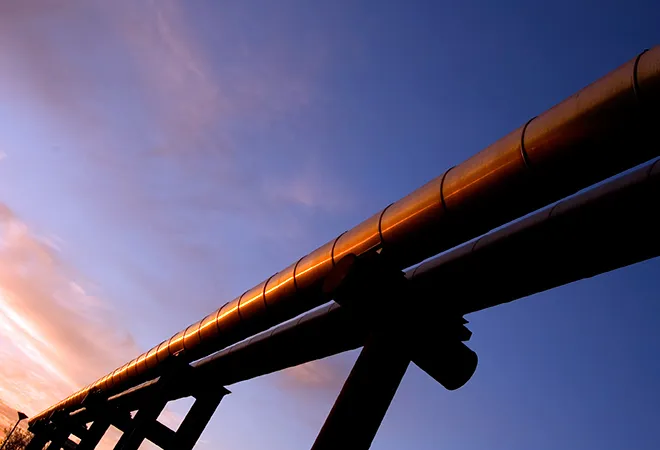-
CENTRES
Progammes & Centres
Location
The intervening time could be utilised to deliberate on carrying out technical and commercial feasibility studies, identifying logistical challenges and opportunities, specific routes, the quantum of the infrastructures required, possible funding sources, etc. for energy trade through land-sea route at an opportune moment in the future.

Since the very inception of the Turkmenistan-Afghanistan-Pakistan-India (TAPI) gas pipeline project, there always existed a section within the energy and strategic community in India which held reservations about its actual realisation. It was felt in some quarters that given the nature of predictable volatility in the transit countries, the gas pipeline project was a non-starter from the very beginning. The opinion emanating from this section of energy and strategic community is somehow becoming further reinforced in the last six years, wherein despite the ground-breaking ceremony in Turkmenistan in December 2015, the status of the pipeline construction remains unclear. It was also reported that the ground-breaking ceremony of the Afghan section of the pipeline took place in 2018.
However, in the last few months, reports have emerged that Turkmenistan is making efforts to purchase steel pipes for the construction of the TAPI gas pipeline. Irrespective of whether the construction on Turkmen side has started or not, one interpretation that could be drawn from a report by analyst Bruce Pannier, is that Turkmenistan, despite the delay in operationalising of TAPI pipeline, is hopeful about pursuing gas exports to South Asian markets.
By taking initiative for the pipeline’s construction, it is making efforts to motivate other stakeholders to pay attention to the pipeline.
If, as the report suggests, Turkmenistan is moving ahead with the pipeline construction for TAPI gas pipeline, then it would be most prudent for it to consider holding back its excitement for the time being. While this Central Asian economy has been trying to explore new outlets and markets to carry its gas for several years, it needs to be understood that the time is just not right at the moment for any forward movement on TAPI pipeline’s construction. From the perspective of Turkmenistan, it is understandable why it is resorting to the construction of its own section of the pipeline. By taking initiative for the pipeline’s construction, it is making efforts to motivate other stakeholders to pay attention to the pipeline. In a normal scenario, such a move could have paid rich dividends as other countries, companies and banks would have been encouraged to support pipeline construction and associated activities. However, it would be worthwhile for Turkmenistan to realistically assess the unfolding geopolitical and commercial dynamics in transit countries such as Afghanistan and Pakistan before moving further with any additional construction activities at this juncture, as they may further increase the burden on its economy. It is true that Afghanistan has showed keenness towards pipeline construction on its side and the fact that the Taliban too has evinced support. Nevertheless, how much of TAPI pipeline construction will actually fructify inside Afghanistan at this juncture remains to be seen.
Additionally, given the condition of Pakistan’s economy, it wouldn’t be difficult to suggest that Pakistan, despite its keenness in implementing TAPI to fulfill its geo-economic, energy and political aspirations in Central Asia, would find it difficult to finance construction of its side of the pipeline. In fact, it has been reported that Pakistan is also seeking a gas price review from Turkmenistan for the purchase of any gas supplies from the TAPI pipeline project. That report in many ways is an indication that importing Turkmen gas at this juncture would prove to be an expensive affair for Pakistan. Additionally, it could also be read as a subtle admission from Pakistan that it is not confident about the commercial viability of the TAPI pipeline project. Moreover, as a result of the evolving developments in the Indian State of Jammu and Kashmir, the diplomatic and economic relations between India and Pakistan have taken a downward turn.
Given such multidimensional challenges towards the implementation of TAPI gas pipeline, Turkmenistan must engage in discussions with countries such as Iran and India to explore steps to operationalise the land-sea route for energy trade between Turkmenistan through the Iranian port of Chabahar. Simultaneously, Turkmenistan must also consider India’s constraints to pursue activities in the realms of energy trade with and through Iran given the looming threat of the US sanctions over Iran. The land-sea energy trade route could possibly face challenges in getting operationalised due to possible American sanctions it may incur.
Given such multidimensional challenges towards the implementation of TAPI gas pipeline, Turkmenistan must engage in discussions with countries such as Iran and India to explore steps to operationalise the land-sea route for energy trade between Turkmenistan through the Iranian port of Chabahar.
Therefore, the most prudent thing to do at this juncture would be for all the interested countries in the region to wait and watch. The intervening time could be utilised to deliberate on carrying out technical and commercial feasibility studies, identifying logistical challenges and opportunities, specific routes, the quantum of the infrastructures required, possible funding sources, etc. for energy trade through land-sea route at an opportune moment in the future. Secondly, the time could also be utilised by India, Iran and Central Asian countries in familiarising with the dynamics of energy sector in each other’s countries and getting to know each country’s impressions on evolving trends and patterns of global energy markets. A sustained dialogue on the above issues can enable India to familiarise itself with the nature of trade underway and formally cultivate networks along the International North-South Transport Corridor.
In addition to that, India must also simultaneously engage with the United States during any upcoming forum to convey its displeasure about the implications of American sanctions on India’s overall energy and strategic engagement with Iran and Central Asia.
For Turkmenistan, the suggestion of a land-sea option would entail waiting for the geopolitical situation in the region to evolve more favourably. However, given the prospect of enormous accessibility to exciting energy markets in South Asia and the rest of the globe, which the land-sea option can provide, it would indeed be worth the wait. Meanwhile, it would be worthwhile for India and Turkmenistan to focus solely on further cementing bilateral relations. Reports, particularly the section written by Adam Hug for Foreign Policy Centre, has portrayed a discouraging picture of the Turkmen economy. In the same report, Bruce Pannier also documents the food shortages in Turkmenistan. In the light of this scenario, India could indeed think about stepping in at this juncture and open communication with their Turkmen counterparts to gauge an understanding about the economic condition in Turkmenistan. If the situation permits, India should consider offering financial and material assistance, in the form of food supplies to Turkmenistan, given the long standing friendship between the two countries.
The views expressed above belong to the author(s). ORF research and analyses now available on Telegram! Click here to access our curated content — blogs, longforms and interviews.

Sanket Sudhir Kulkarni was Fellow at ORF's Mumbai Centre. Sanket's primary area of interest is studying geopolitics of energy trade. Also, Sanket closely monitors patterns ...
Read More +